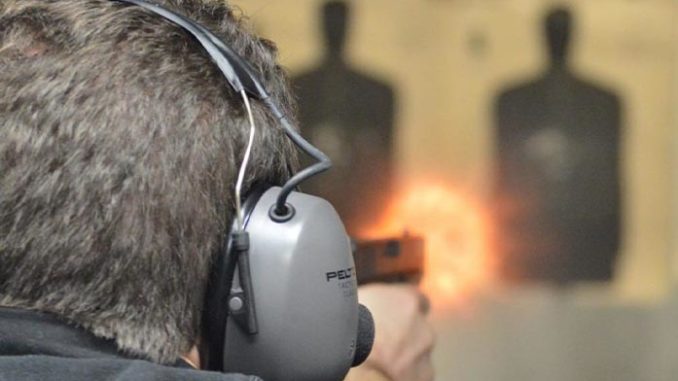
A high-ranking officer with the Huachuca City Police Department carried a handgun on-duty for nearly three years even though there is no record that he completed mandatory firearms qualifications during that time, the town’s police chief confirmed Thursday.
 Lt. Joseph Glowacki resigned by retirement Dec. 10, 2019, the same day an auditor with the Arizona Peace Officer Training and Standards (AZPOST) Board formally notified him that his peace officer certification would be restricted unless Glowacki corrected his firearms training deficiency. The restriction would have prevented Glowacki, who was HCPD’s firearms instructor, from carrying or using a firearm while on-duty.
Lt. Joseph Glowacki resigned by retirement Dec. 10, 2019, the same day an auditor with the Arizona Peace Officer Training and Standards (AZPOST) Board formally notified him that his peace officer certification would be restricted unless Glowacki corrected his firearms training deficiency. The restriction would have prevented Glowacki, who was HCPD’s firearms instructor, from carrying or using a firearm while on-duty.
In Arizona, all certified peace officers of local, county, and state agencies who carry a firearm as part of their duties must complete at least two annual qualification tests overseen by an AZPOST-approved instructor. One test involves proficiency with the assigned service handgun and ammunition, while the other is a target identification and judgment course.
Sometimes an officer can’t complete the training, due to medical issues or special assignments. Most agencies will place a deficient officer on short-time administrative duty or leave until the firearms testing can be completed, which is why each agency has a training coordinator who tracks every officer’s compliance.
Glowacki was HCPD’s training officer, although he never reported himself to AZPOST or his chief, nor pull himself off the streets.
Public records show AZPOST became aware of Glowacki’s training issues late last year as part of a routine agency audit. The board intended to formally restrict his peace officer certification on Jan. 15 until the deficiency is resolved.
But by then the lieutenant had turned in his badge and applied for retirement benefits.
Huachuca City Police Chief James Thies released a statement this week to Arizona Daily Independent explaining that Glowacki was hired by HCPD in 1999. Glowacki was named firearms instructor and training coordinator long before Thies took over as chief in 2016.
“In that position, it was his responsibility to maintain training records for the Department’s officers, including himself,” Thies noted, adding that he didn’t learn of the deficiencies until he received two letters from AZPOST after Glowacki’s retirement.
“As Police Chief, I should have been aware of this deficiency, but the fact remains, I was not,” Thies stated. “I will endeavor to ensure that this type of lapse does not occur again in Huachuca City.”
Surprisingly, while the rules mandate the two annual firearms qualifications, AZPOST does not audit every officer’s training records each year.
According to AZPOST Executive Director Matt Giordano, its annual auditing protocols are based on an agency level, not on an individual officer level. It’s one reason every agency is supposed to have a specified training coordinator.
During the audit of an agency like HCPD, AZPOST staff is given access to training records for randomly selected officers. The audit looks at whether those officers completed their firearms qualifications in the prior calendar year.
In May 2017, Glowacki was included in the sample for HCPD. The auditor confirmed the lieutenant completed his firearms qualifications in April 2016, making him in compliance for the calendar year 2016.
Then in November 2019. Glowacki was again included in the sample of HCPD records reviewed by AZPOST. This time, the auditor found no record of Glowacki completing firearms training after April 2016.
That meant Glowacki, as HCPD’s firearms instructor and training coordinator, should have placed himself on restricted duty on January 1, 2018 as he failed to comply with the training requirement for the calendar year 2017. A subsequent audit of HCPD’s records on Dec. 10, 2019 found no documentation that Glowacki completed firearms qualification in the calendar year of 2018.
In total, Glowacki carried his service gun for nearly three full years without undergoing the requisite annual training.
Even though Glowacki retired, the AZPOST board formally restricted his certification on Jan. 15. He will have to address the firearms issue with the board if he seeks to return to a law enforcement position.
Glowacki’s firearms training deficiency could have proved disastrous for a small town like Huachuca City, according to a prominent Tucson attorney.
“If a person is injured as a result of the actions of an officer who the department failed to ensure received the proper training, the department may be exposed to significant civil liability,” says Louis Fidel of Piccarreta Davis Keenan Fidel. “The extent of liability would relate to the nature of the injury and the extent of the failure to comply with the standard of care for maintaining officer training.”
Fidel also pointed out that the law gives police officers much broader authority to discharge firearms than it does to civilians.
“AZPOST regulations on firearms training ensure that officers entrusted with that authority are capable of using it safely,” he noted. “Police departments have an obligation to make sure that their officers are in compliance with AZPOST training requirements so that they can effectively carry out their duty to protect the public.”

